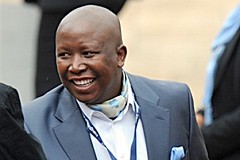
African National Congress Youth League leader Julius Malema has recently visited the Southern African nation of Zimbabwe where he praised the indigenization process.
Originally uploaded by Pan-African News Wire File Photos
Zimbabwe Sunday Mail
Race relations have sharply deteriorated in Southern Africa in recent years and the main reason for this is clear to any thinking person: racially skewed ownership of the means of economic production.
Social justice teaches us that it is not poverty, per se, that pushes a long-suffering population to the brink of civil war; rather, it is inequality and exclusion that really stoke tensions in a society.
To the down-trodden masses in this part of the world, the neo-liberal gospel of “democracy, human rights and rule of law” rings hollow. The people here are sceptical because they have not seen the dividends of globalisation — itself a euphemism for a sinister system that makes the rich richer and the poor poorer. In fact, globalisation is imperialist intrigue under a new guise.
It has taken a while for the wretched masses in this region to speak out against imperialist exploitation, but a grassroots movement is gaining momentum from the Congo to South Africa and from Angola to Mozambique, and very soon we can expect a full-fledged revolution.
The revolution this time is not a struggle for political independence; every country in Southern Africa has attained political independence one way or the other. The new struggle is about economic emancipation.
Julius Malema, the leader of the African National Congress Youth League, was in Zimbabwe last week on a ground-breaking visit that could have far-reaching ramifications for regional politics.
The symbolism of Malema’s trip was remarkable and its significance is yet to be fully appreciated by a Zanu-PF that has not done much in recent years to hype its liberation credentials.
Malema’s energetic approach would have prodded the Zanu-PF Youth League into action. Every liberation movement must have a vibrant youth league. Youths are not just “the leaders of tomorrow”; they are the energy of today. No serious mass-mobilisation campaign can be conducted without the active participation of young people.
To his credit, the ANC Youth League president made no apologies for the shared liberation ethos of Zanu-PF and the ANC. He spoke about South Africa’s experiences vis-à-vis black empowerment, land reform and economic development.
It is gratifying that the ANC has young leaders who comprehend the imperatives of indigenous economic empowerment. South Africa is a powder keg today.
Although political apartheid is dead and buried, economic apartheid is alive and kicking.
Some 4,2 million South Africans live on a dollar a day or less, up from 1,9m in 1996. While poverty is clearly a national problem for that country, inequality is even more catastrophic.
Look at the raw figures. An average of 52 people are murdered every day and there are 200 000 robberies each year, as well as 55 000 rapes and 500 000 assaults. If you think this is a tragedy, wait and see what happens in a few years’ time if the ANC fails to dismantle the economic apartheid that has firmly taken root since 1994.
As Africa’s oldest liberation movement, the ANC has a responsibility to assist in reviving other liberation parties on the continent.
In many a country, the party of liberation lies derelict in the dustbin of history, swept out of power by a Western-sponsored pseudo-opposition party. The Western governments know what they are doing by toppling the liberation movements. They are laying the ground for the re-colonisation of Africa. This is no idle threat.
Opponents of Zimbabwe’s ongoing economic indigenisation drive are trying to defend Western economic interests at the expense of the dispossessed majority.
Should we really be surprised that the capitalist masters of the universe and their disingenuous lackeys are feverishly opposed to black economic empowerment? Not at all. They have exploited the masses for too long and are now driven by a warped sense of entitlement.
Some Western diplomats in Harare have shamelessly sought to defend the indefensible.
If the Germans think that Zimbabweans deserve a life of perpetual servitude, then they should be told that they are free to take their “investment” elsewhere. Let them understand this.
We have also seen some elements in the Western-sponsored media — both in Zimbabwe and abroad — passionately defending the subjugation of the black majority. They are clearly off-side and history will give them their marching orders. Everyone knows they are singing for their supper.
Indigenisation is meant to address the wrongs of colonialism. Left to its devices, liberal capitalism will not even acknowledge the wrongs of colonialism in Africa — let alone correct them.
Faced with the brutal reality that colonialism created a rich minority and a poor majority, are we saying the Government of Zimbabwe should sit back and do nothing about the unacceptable inequalities we see in our society today? And should we accept this injustice 30 years after our Independence? Certainly not. Black economic empowerment is an integral part of decolonisation.
It is a matter of justice. History will vindicate this position. If Zimbabweans cannot own the Zimbabwean economy, then which economy will they ever own?
No comments:
Post a Comment